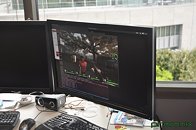
Latest Asahi Linux Brings AAA Windows Games to Apple M1 MacBooks With Intricate Graphics Driver and Translation Stack
While Apple laptops have never really been the first stop for PC gaming, Linux is slowly shaping up to be an excellent gaming platform, largely thanks to open-source development efforts as well as work from the likes of AMD and NVIDIA, who have both put significant work into their respective Linux drivers in recent years. This makes efforts like the Asahi Linux Project all the more intriguing. Asahi Linux is a project that aims to bring Linux to Apple Silicon Macs—a task that has proven rather difficult, thanks to the intricacies of developing a bespoke GPU driver for Apple's custom ARM GPUs. In a recent blog post, the graphics developer behind the Asahi Linux Project showed off a number of AAA games, albeit older titles, running on an Apple M1 processor on the latest Asahi Linux build.
To run the games on Apple Silicon, Asahi Linux uses a "game playing toolkit," which relies on a number of custom graphics drivers and emulators, including tools from Valve's Proton translation layer, which ironically was also the foundation for Apple's Game Porting Toolkit. Asahi uses FEX to emulate x86 on ARM, Wine as a translation layer for Windows apps, and DXVK and vkd3d-proton for DirectX-Vulkan translation. In the blog post, the Asahi developer claims that the alpha is capable of running games like Control, The Witcher 3, and Cyberpunk 2077 at playable frame rates. Unfortunately, 60 FPS is not yet attainable in the majority of new high-fidelity games, there are a number of indie titles that run quite well on Asahi Linux, including Hollow Knight, Ghostrunner, and Portal 2.
To run the games on Apple Silicon, Asahi Linux uses a "game playing toolkit," which relies on a number of custom graphics drivers and emulators, including tools from Valve's Proton translation layer, which ironically was also the foundation for Apple's Game Porting Toolkit. Asahi uses FEX to emulate x86 on ARM, Wine as a translation layer for Windows apps, and DXVK and vkd3d-proton for DirectX-Vulkan translation. In the blog post, the Asahi developer claims that the alpha is capable of running games like Control, The Witcher 3, and Cyberpunk 2077 at playable frame rates. Unfortunately, 60 FPS is not yet attainable in the majority of new high-fidelity games, there are a number of indie titles that run quite well on Asahi Linux, including Hollow Knight, Ghostrunner, and Portal 2.

















